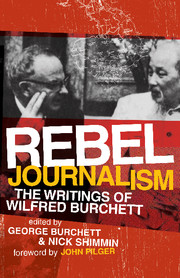Book contents
- Frontmatter
- Contents
- List of Photographs
- Acknowledgements
- Foreword by John Pilger
- Foreword by Gavan McCormack
- Introduction
- 1 The Atomic Plague [1945]
- 2 With Mick Griffith to the Plaine des Lacs [1941]
- 3 Who is Wingate Anyway? [1944]
- 4 The Trial of Cardinal Mindszenty [1951]
- 5 Liberty in Eastern Europe [1951]
- 6 The Microbe War [1953]
- 7 Koje Unscreened [1953]
- 8 The Ball-Point Pen Murders [1954]
- 9 South of the 17th Parallel [1955]
- 10 Front-Line Village [1959]
- 11 Welcome Home [1961]
- 12 Gagarin: The First Interview with Western Journalists [1961]
- 13 Virgin Lands [1962]
- 14 Lilac and Outer Space [1962]
- 15 War Against Trees [1963]
- 16 The Tragedy of South Vietnam's Ethnic Minorities [1964]
- 17 Interview with General Vo Nguyen Giap (April 13, 1964)
- 18 A Fortified Hamlet [1965]
- 19 Patriots & Mercenaries [1965]
- 20 At Ground Level [1966]
- 21 A Spurned Olive Branch [1967/1977]
- 22 Personal Leader [1968]
- 23 The Tet of Peace [1973/1977]
- 24 ‘Something from Nothing’ Township [1976]
- 25 Evaluating the Past [1976]
- 26 Mercenaries: British Export Model [1977]
- 27 The Geneva Conference [1978]
- 28 How to be a Good Khmer Rouge [1981]
- 29 China Prepares to Attack Vietnam [1981]
- 30 Afterword [1983]
- Notes
- Bibliography
- Index
24 - ‘Something from Nothing’ Township [1976]
Published online by Cambridge University Press: 22 September 2009
- Frontmatter
- Contents
- List of Photographs
- Acknowledgements
- Foreword by John Pilger
- Foreword by Gavan McCormack
- Introduction
- 1 The Atomic Plague [1945]
- 2 With Mick Griffith to the Plaine des Lacs [1941]
- 3 Who is Wingate Anyway? [1944]
- 4 The Trial of Cardinal Mindszenty [1951]
- 5 Liberty in Eastern Europe [1951]
- 6 The Microbe War [1953]
- 7 Koje Unscreened [1953]
- 8 The Ball-Point Pen Murders [1954]
- 9 South of the 17th Parallel [1955]
- 10 Front-Line Village [1959]
- 11 Welcome Home [1961]
- 12 Gagarin: The First Interview with Western Journalists [1961]
- 13 Virgin Lands [1962]
- 14 Lilac and Outer Space [1962]
- 15 War Against Trees [1963]
- 16 The Tragedy of South Vietnam's Ethnic Minorities [1964]
- 17 Interview with General Vo Nguyen Giap (April 13, 1964)
- 18 A Fortified Hamlet [1965]
- 19 Patriots & Mercenaries [1965]
- 20 At Ground Level [1966]
- 21 A Spurned Olive Branch [1967/1977]
- 22 Personal Leader [1968]
- 23 The Tet of Peace [1973/1977]
- 24 ‘Something from Nothing’ Township [1976]
- 25 Evaluating the Past [1976]
- 26 Mercenaries: British Export Model [1977]
- 27 The Geneva Conference [1978]
- 28 How to be a Good Khmer Rouge [1981]
- 29 China Prepares to Attack Vietnam [1981]
- 30 Afterword [1983]
- Notes
- Bibliography
- Index
Summary
In the early 1970s, Wilfred Burchett was a frequent visitor to Beijing while writing a book with Prince Norodom Sihanouk of Cambodia (My War with the CIA) and covering Nixon's visit to China for America's CBS. He also covered China's re-admittance to the UN in New York and took a break from that to take up the offer of breakfast with Henry Kissinger at the White House, an offer extended by Kissinger as a result of Burchett's reputation as the best-informed journalist in Indochina. So it was logical that he would also want to take a break from war in Indochina to investigate post-Cultural Revolution China, and in the wake of ‘ping-pong’ diplomacy and Nixon's 1972 visit to the country, the West was demonstrating a growing interest in all things Chinese.
At the same time, tensions were increasing between China and the USSR, with Vietnam caught in the middle. In the summer of 1973, Burchett and his old friend, New Zealand author, journalist and China expert Rewi Alley, set out on a journey across China, each of them covering a particular part of the vast country and a variety of topics: people's communes, oil fields, minorities, women, youth, health, education and so on. The intent was described in the Introduction to the book: ‘Our central interest has been to measure the changes that have occurred in recent years in China and to set them in perspective against what we knew of old China. We tried to understand also how ordinary Chinese citizens conceive that much-bandied-about term “quality of life”. Their concepts were bound to be different from those who measure human progress by the “gross national product” – a point of view badly shaken in many countries by the “energy crisis” in the latter part of 1973.’
The result of their collaborative effort was one of Burchett's best-selling books, China: The Quality of Life.
- Type
- Chapter
- Information
- Rebel JournalismThe Writings of Wilfred Burchett, pp. 242 - 251Publisher: Cambridge University PressPrint publication year: 2007

